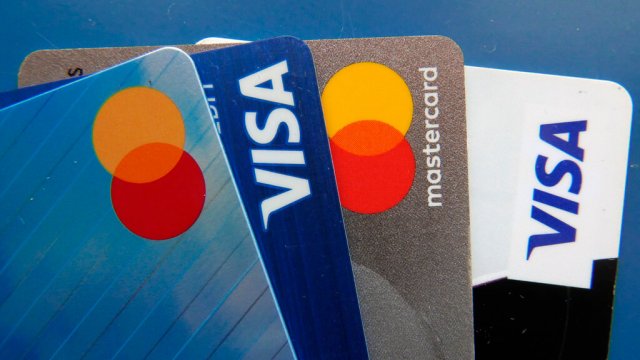Americans are carrying more credit card debt than ever before, a total of about $1 trillion.
The Federal Reserve officially clocks the total at $986 billion, while a separate analysis from WalletHub puts the number at $1.2 trillion. Either way, it's an unprecedented figure for American consumers, and it's a number that rapidly ballooned in the last two years, growing about a quarter trillion dollars.
Post-pandemic, as consumers got back on the market and inflation soared, Americans started buying more essentials with credit. 46% of Americans now carry a credit card balance month-to-month, a figure that jumped 7% since this time last year.
At the same time, our debt is getting harder to pay off. The Federal Reserve reports the average credit card interest rate climbed more than 4% since last year to almost 21%, and new cards are coming with an average interest rate of 24%.
SEE MORE: American household debt reaches $17 trillion for first time
Financial experts say while getting credit card debt under control can be overwhelming, it only gets worse the longer you put it off. As you rack up debt and potentially miss payments, your credit score plummets.
"A late payment can stay on your credit report for 7 years," said Kristen Holt, CEO of a Florida company that counsels people on financial health. "The more delinquent you are, the worse it gets. And then your card's probably gonna get closed."
Building a budget is the obvious first step. Experts say you should classify expenses as essential (rent, groceries, utilities) or discretionary (eating out, travel, subscriptions) and cut where you can.
"Unnecessary things are like extra apps," said Anthony O'Neal, a personal finance expert. "You don't need Netflix, Hulu and Amazon Prime. And for single people: We don't need to be going on dates every single weekend. So let's get focused on a budget."
Paying down smaller debts first can help make managing debt less intimidating. And some people might benefit from consolidating debt into a single loan payment every month.
"Right now I'm assessing every single thing that requires any kind of money from me," O'Neal said. "And I'm saying, 'What is the best thing for me and my family moving forward?'"
Experts also say credit card holders should work with their card issuer to negotiate a lower interest rate where possible.
Trending stories at Scrippsnews.com



